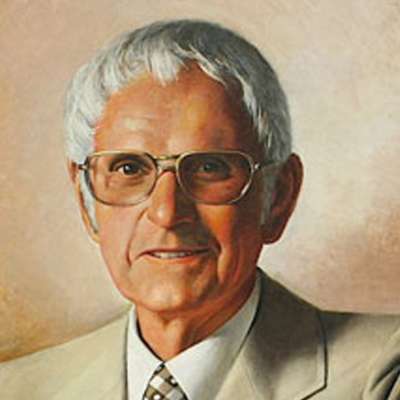
William Fisk Harrah
Childhood
Bill Harrah (William Fisk Harrah) was born on September 2, 1911, in South Pasadena, California. His father was John Harrah, a political lawyer, attorney and small business lawyer. Already as a child, Bill was a determined and goal-oriented child. These traits were evident when the car his father had bought for him was stolen. Bill vowed that he would buy replicas of every car his family had ever owned and subsequently fulfilled his promise.
Harrah attended Chaplin College and then studied mechanical engineering at UCLA. He was unable to finish his degree, however -- because of the Great Depression in the late 1920s, he had to start working for businesses owned by his father. Among them were:
- hot dog stand,
- a pool hall,
- shooting gallery,
-
bingo hall.
Career
At one time, Bill was the manager of a bingo hall called the Reno Game. At the time, bingo was semi-legal in California, and the family hall was shut down several times by local authorities. And each time, John Harrah, an experienced lawyer, got permission again. But the costs of running the business were still too high, and Bill advised his father to invest more in the business. John told his son:
. "If you're so smart, pay me the money and do it yourself as you know how."
Bill took up the challenge, paid his father $500 and at the age of twenty-one became the full owner of the bingo hall. And within three years, he turned a bingo hall that was bringing in $100 a week into a nice business generating $50,000 in profits a year.
Tired of fighting the law, he decided to move to Reno to open his first bingo club. In the fall of 1937, he opened Harrah's Bingo Club, located too far from downtown, and went bankrupt three months later. Bill was worried about this for a while, but after doing some work on his mistakes and taking Virgil Smith as a partner, he opened another bingo studio, Harrahs Plaza Tango, in the summer of 1938. A little later he opened another bingo club called Plaza Tango and bought Ed Howe's Tango Bingo Club.
After becoming a prominent figure in the gambling business in Reno, Bill was obligated to contribute to the Reno Gaming Fraternity so that his businesses could operate. Circumstances worked out well and he met Cal Custer, a former bootlegger who used to work with his father. Cal put in a good word for him and eventually Bill was accepted into the Reno Gaming Fraternity after paying a $1,000 fee. He opened another club, Harrah's Reno, in the 1940s.
For many years, Bill owned several small bingo halls in downtown Reno that offered excellent customer service. Bill was the first to introduce the principles of standardization: all employees at his establishments received special training before they were allowed to work. In this way, all customers received the same high level of service no matter which Harrah's club they visited.
In 1955, Harrah's bought George's Gateway Club, located on the South Shore of Lake Tahoe, and named it Harrah's Club. Bill insisted that his casino was a head above those around him. When he first saw the Lake Tahoe casino in the 1950s, he exclaimed:
"We have a nice club in Reno, and these seedy places in Stateline make twice as much as we do."
One of his ideas was to keep the club open year-round, something no other casino operator has done before, given the heavy snowfalls that have blanketed the Lake Tahoe neighborhood. Other gambling promoters chortled when Harrah's sent buses around Northern California to pick up players and transport them deep into the mountains to Harrah's Club. Those players were called the "Bus People," and they made the Lake Tahoe club a success.
But not only because of them, the innovative management Bill Harrah's introduced played a big role. His spotlessly clean, glass-fronted, plush-carpeted casino was a stark contrast to the rough-hewn frontier sweepstakes of the time and was the first to feature one-way mirrors to watch dealers and cashiers handling chips and cash. By 1948, Harrah's Club had annual revenues of more than $1.5 million.
Harrah's Club's annual revenues were more than $1.5 million. In the late 1950s, Bill bought Sahati's Stateline Country Club, named it Harrah's Lake Tahoe and began "remodeling." Four years later, it was the world's largest casino, including a ten-acre parking lot, two restaurants, an 850-seat theater staffed by star performers, an exhibit hall, 150 slot machines and 15 gaming tables. For several years, Harrah's Lake Tahoe was the most profitable casino in the state of Nevada.
Annual revenue from Harrah's two casinos in 1961 was estimated at $40 million, and four years later Bill Harrah's was named the largest gambling operator in the world. With 2,500 employees, it was the largest employer in Nevada.
Until the 1970s, no gaming company had ever been listed on a major stock exchange. Bill Harrah's changed all that. In 1971, Bill Harrah's organized Harrah's Inc, which made an initial public offering. In 1972, it was listed on the American Stock Exchange, and the following year it became the first gambling company listed on the New York Stock Exchange.
That same year, 1973, Bill bought the Holiday Casino in Las Vegas, setting a new record. Harrah's Inc. became the first gaming company to open casinos in three different locations:
- in Reno,
- in Lake Tahoe,
- Las Vegas.
Once his business was up and running like clockwork, Bill Harrah delegated management of day-to-day operations to top managers. He devoted much of his time and money to his car collection, which was valued at more than $40 million at the time of his death.
Car collecting is worth mentioning separately. Journalist Leon Mandel coined a terrific phrase when he described Bill Harr as a "pathological car enthusiast." It's the most apt description that has ever been put on anyone in the history of the hobby, because in car collecting, Harrah's was unrivaled and almost certainly never will be.
He owned the world's largest car collection, which included a large fleet of rare cars, motorcycles, boats and airplanes. Among his automobiles were:
- Mercedes Benz 500k Special Roadster 1936,
- . Airmobile of 1937,
- A 1977 Jerrari,
- . Tucker, Lincoln,
- Mecury,
- Phantom Corsair,
- Bugatti Type 41,
- Chrysler 1941.
By the end of his life, Harrah's owned approximately 1,400 cars, many of which had "World's Only" or "World's Best" status.
Personal life
Bill Harrah was a rather amorous man. He was married seven times to six different women. This is what the list of his wives looks like:
- Thelma Batchelor - married in 1940 and divorced in 1948;
- . Scherry Teague - married twice in 1948 and divorced in 1969. With her, he adopted two boys named John and Tony;
- Bobbie Gentry, popular singer - married in 1969 and divorced in 1970;
- Mary Burger - married in 1970 and divorced in 1971;
- Roxanna Carlson - married in 1972 and divorced in 1973;
- Verna Rae Harrison, movie producer - married in 1974 and lived with her until his death in 1978.
In 1972, Bill underwent successful surgery to repair an aortic aneurysm. However, on June 30, 1978, he underwent heart surgery, which he did not survive due to complications from the aortic aneurysm.
Bill Harrah died at the age of 66. He is laid to rest at Hailey Cemetery in Hailey, Idaho, U.S.A.
Revenue
Bill Harrah's turned the Reno bingo parlor into Harrah's Entertainment, Inc. a Nevada company consisting of casinos, hotels and nightclubs. Harrah's net sales increased from $78 million in 1970 to $196 million in 1978, and net income rose from $4.3 million in 1971 to a record $17 million in 1978.
When Harrah's died in 1978, he left his heirs nearly six million shares of his company's stock, but had no money to pay inheritance taxes of $35 million and $13 million in debt to a Reno bank.
Interesting facts
No other casino operator is the subject of more books than Bill Harrah. Nine books have been written about his life.
The company Bill Harrah's founded, Harrah's Entertainment Inc, renamed Caesar Entertainment Corporation, is now the world's largest gaming operator and owns and operates more than 50 casinos worldwide.
Harrah's was the first to invite African-American entertainers to perform at its casinos. He was also the first to start hiring women as dealers.
Legacy
Bill Harrah was one of the most famous casino operators in the world, who also owned the largest collection of automobiles. His focus on effective management and efficient marketing became a standard in the world of gaming.
Bill Harrah was one of the most famous casino operators in the world. Many of his ideas are basically elementary, nothing more than common sense. But somehow no one else was doing any of these things until Bill Harrah made these things the standard. He laid the groundwork for the entire current gambling industry. Here is a partial list of his gaming innovations:
- Casino carpeting.
- Main bus programs.
- The name "Gaming" instead of "Gambling."
- Premium points are the equivalent of today's free play.
- Concentration on slot machines.
- Daily performance summaries.
- Government funding through the American and New York Stock Exchanges.
- Equal and equal treatment of players regardless of gender, race or religion.
- Competitive staffing levels.
- Casino golf tournaments.
- Widespread use of consultants for policy and strategy development.
- Detailed job descriptions and equally detailed training manuals.
- Extensive data collection (both casino and automobile)
Bill Harrah was a strong advocate of safe and fair gaming, and through his influence, the Nevada Gaming Control Board was created in 1955. He was also instrumental in the creation of the Nevada Gaming Commission in 1959.
Bill hated racism and any inequality. His casinos were the first to be open to players of any race, color and creed. He hired anyone who was suitable for the job despite the person's skin color and gender, which was very revolutionary for the times.
The 175 cars in Bill's collection became the basis for the National Automobile Museum in Reno, while others were donated to the Imperial Palace Car Collection in Las Vegas.
The William F. Harr College of Hotel Management at the University of Nevada was named after him.
















